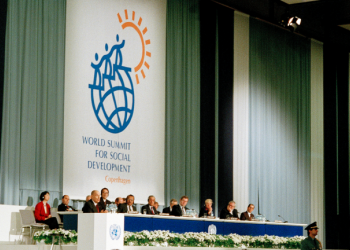The Heart of Copenhagen: 25 Years of Social Development and the Path Ahead
By Daniel Perell
Twenty-five years ago, the World Summit on Social Development took place at the height of optimism about the future of the international order. Its landmark Declaration advocated principles that remain unsurpassed today:
That “social development and social justice are indispensable for the achievement and maintenance of peace and security.”
That “societies must respond more effectively to the material and spiritual needs of individuals, their families and the communities in which they live.”
That all individuals, especially those living in poverty, should “exercise the rights, utilize the resources and share the responsibilities that enable them to lead satisfying lives and to contribute to the well-being of their families, their communities and humankind.”
Since that time, sustained progress toward the Declaration’s central objectives of eradicating poverty, unemployment, and social exclusion has remained stubbornly elusive. A fundamental question thus faces those of us committed to the vision of social development: What will be required to overcome the obstacles that stand in the way of realizing those noble aims and aspirations?
The drafters of the Declaration knew that the progress of any society cannot be divorced from the health of the relationships that sustain it—between individuals, communities, institutions, and nations. Today, those relationships unfold in a context of unprecedented interdependence. Challenges are increasingly planetary in scope. And growing numbers have therefore concluded that humanity ultimately rises or falls as a single global family—and that the good of the part is now most lastingly and reliably achieved by working for the good of the whole. As my Office wrote in a statement to the World Summit in 1995:
The bedrock of a strategy that can engage the world’s population in assuming responsibility for its collective destiny must be the consciousness of the oneness of humankind. Deceptively simple in popular discourse, the concept that humanity constitutes a single people presents fundamental challenges to the way that most of the institutions of contemporary society carry out their functions.
Awareness of this reality is growing, particularly in climate change and environmental circles. Yet UN spaces are generally characterized not by recognition of the common humanity of all, but by a culture of competition which tends to advance the interests of those already benefiting most from the system. Rather than acting as a necessary counterweight to ensure advancement in the circumstances of those with the fewest opportunities, the present model often serves to exacerbate this injustice.
Reversing these trends will require those of us who enjoy the privilege of walking the halls of the UN to tend to others’ needs as carefully as our own. This, to me, is the heart of what the Copenhagen Declaration was saying. Its authors, advantaged as they might have been, were able to draw on the spirit of that historical moment to turn attention to the well-being of populations of all kinds, many of whom they might never meet personally.
This transformation of personal motive will need to be accompanied by an equally robust transformation of institutional systems and structures. The paradigm of absolute state sovereignty, for example, has become one of the primary obstacles to solving pressing global challenges. For many, inaction on global inequalities—fueled by the continuing inclination to accumulate more resources than perceived rivals, whether personal or national—is emblematic of the limitations of the current order. Arrangements of all kinds will need to be re-imagined in the context of humanity as a single, albeit diverse, whole—each part contributing to its functioning and each deriving benefit from its well-being.
This year of anniversaries at the United Nations provides us with an opportunity for deep and thoughtful reflection. What contributed to progress made in recent decades? And what will be required to overcome the formidable challenges—and seize the thrilling opportunities—that lie ahead? The vital spirit of universal human solidarity that infuses the Copenhagen Declaration makes clear that commitment to the oneness of humankind, with all its attendant implications, must be the starting point for any deliberations at the international level. This is the necessary foundation for lasting progress and well-being.
Daniel Perell is a Representative of the Bahá'í International Community to the United Nations
